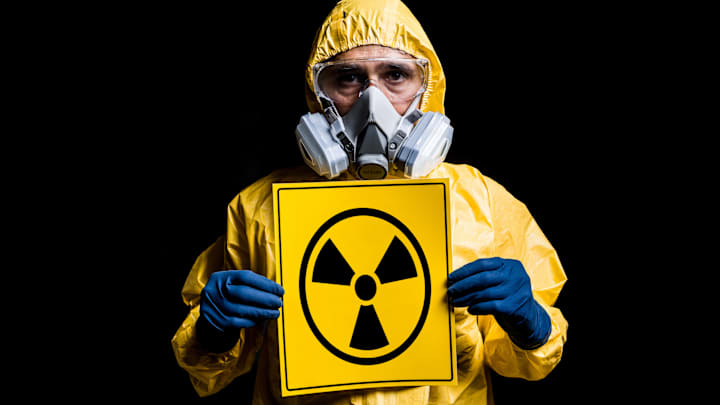Most of us would like to think that if we found ourselves at the center of a potentially world-ending crisis, we would turn into a real-life action hero: Keep a cool head, do what was necessary, save a bunch of lives, and be home in time for dinner.
One of the things such a hero might find themselves doing? Disarming a nuclear bomb. Say a ragtag group of evildoers led by an eccentric but charismatic figure (picture: Nicolas Cage) got a hold of the most powerful weapon ever developed by humankind ... which is set to go off ... and you’re the only one there to stop it. You’ve got a few basic tools, an expert on the phone, and a sweaty forehead. How’s it likely to pan out?
Bombs 101
For fairly obvious reasons, a lot of the specific ins and outs of how nuclear weapons work is classified. If there was a reliable WikiHow on disarming a nuke, there would probably also be one on making your own, and that’s not a situation the world needs.
That said, the majority of nuclear bombs are generally thought to have some overlap in how they work; specifically, that they are “armed” (or activated) by what are known as permissive action links, or PALs. The whole point of these is that they’re incredibly difficult to get through. Nuclear physicist and weapons inspector Peter D. Zimmerman once quoted an anonymous weapons designer as stating that bypassing a PAL should be “as complex as performing a tonsillectomy while entering the patient from the wrong end.”
Read More Stories About Survival Tactics Here:
This is the stuff that, in the movies, is often presented as inputting some codes, or two military higher-ups having to turn keys at the same time—basically, a mechanism to make it incredibly difficult for a bomb to be accidentally detonated or for anyone to arm the bomb for nefarious purposes.
“The weapons in the U.S.’s arsenal—and very likely in most arsenals—have many built-in functionalities to permanently or semi-permanently disable the device in case of an unauthorized arming attempt of the device,” Areg Danagoulian, an associate professor of Nuclear Science and Engineering at MIT, tells Mental Floss.
What this means is that hopefully it’s a lot easier to disarm a nuke than to arm one. They’re designed to only be armed if everything is done exactly as it should be, with numerous failsafes built in to prevent any ne’er-do-wells from using them for evil.
To Explode or Not to Explode
Those precautions make sense, as a key element of designing nuclear weaponry is ensuring it doesn’t explode when it isn’t meant to. If the most important thing a bomb is designed to do is explode, the second most important thing should be for it to not explode.

If you’re really lucky, the process of disarming the particular nuclear bomb you’ve stumbled upon might be extremely straightforward. The B61 bomb, which is the model most of the U.S’s nuclear bombs are, is reported to have “a ‘command disable’ mechanism,” Danagoulian says. “If someone activates this mechanism, it will cause the electronics of the bomb to be destroyed by a strong current, making the bomb near-useless.”
The nuclear bomb equivalent of the emergency stop button on an escalator might be too good to be true, but the next best thing is the nuclear bomb equivalent of putting the wrong PIN into your phone too many times and freezing it.
“According to some sources, if one enters the wrong arming digital sequence—what you might think of as a nuclear code—a certain number of times, the electronic system will lock up or possibly even mis-detonate the weapon to destroy it,” Danagoulian says.
The Verdict
While this sounds vaguely terrifying, Danagoulian points out that if this is the case, it won’t be a nuclear explosion. It would instead probably be a localized chemical explosion that would disable the bomb and likely not harm anyone—other than the individual trying to tamper with it.
Certain death is probably not what you were hoping your reward would be for trying to be a hero, but it’s good news for the rest of the world. And there’s something almost poetic in the idea that, in the most dire circumstances, millions of lives could potentially be saved by just desperately palming the hell out of all the controls available to you until the bomb gives up and destroys itself. The only force more powerful than a nuclear bomb: mindlessly mashing buttons in the hope everything will work itself out.
